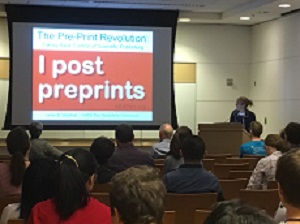I recently re-read a 2014 editorial in PLOS Computational Biology entitled, “Ten Simple Rules of Live Tweeting at Scientific Conferences” which reminded me of the positive impact that this popular microblogging platform can have when used correctly. When conference organizers do it right, Twitter can be a quick and easy communication channel that attendees can use: to share a comment in real-time, to point others in the Twitterverse to papers of interest, to encourage attendees to join a session, or to promote their own research. All of this accomplished with brief messages of no more than 140 characters, making this online social networking tool a powerful resource.
I have to admit, while I do see the value in using Twitter, I personally don’t tweet very much. I do, however, follow many handles that include key trailblazers in my field, publishers and oncology journals, cancer-related organizations, open access and data management initiatives, and scholarly productivity tools that would be of interest to my library users. In particular, I follow @MSKCC_Library and find this to be an excellent way for me to stay in the know on topics that matter to me. Scrolling through the tweets on the way home each night takes very little time. And the time invested usually pays off with me identifying tweets (topics) worth pursuing in greater depth.
With conference season upon us, I thought this was the perfect time to share how tweeting at these events could enhance your overall meeting experience, or perhaps like me, you may benefit from following the conference’s hashtag!
Donna Gibson
Director of Library Services
 What are preprints and how can they benefit scientists?
What are preprints and how can they benefit scientists? In early June, I attended the
In early June, I attended the